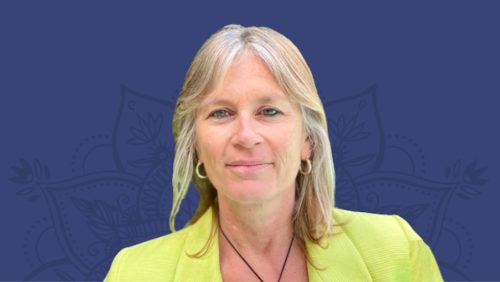
Sara Bennett Faculty Spotlight
Professor & Associate Chair in the International Health Department Director of the Health Systems Program GKII Faculty Co-Chair
“India has no shortage of medical technologies and treatments, but the real challenge is getting them out to the populations who are most in in need of them.”
Dr. Sara Bennett, a seasoned health policy and systems researcher, has been involved with India’s healthcare sector since her early career. Her expertise lies in dissecting health systems’ structures, focusing on financing and governance, in an effort to comprehend policy formation.
Her beginnings in this field started with a project in India, examining public-private partnerships and the role of private healthcare, a crucial sector that can benefit from support. “My early work involved exploring how the government could better collaborate with the private sector,” Dr. Bennett recounts. Her academic journey started at the London School of Hygiene and Tropical Medicine, where she delved into the roles of government, especially in contracting services to private entities in Tamil Nadu.
She has continued to work in India on and off ever since and has several major projects she’s involved with. The India Primary Health Care Support Initiative, led by Dr. Krishna Rao, is looking at primary healthcare strengthening across three different states in India. Another focused on building the management and public health capacities for the health system in Uttar Pradesh, is called the Uttar Pradesh Health Systems Strengthening Project, led by Dr. Brian Wahl. A new project she has just started is providing advice to the Gates Foundation in India about transitioning out of projects and handing over project elements to the government and other local stakeholders while seeking to maintain project outcomes..
Improving Health Outcomes Across India Through Education
When trying to get projects off the ground, Dr. Bennett explained that “India has a huge amount of talent. There’s many thoughtful people with creative ideas around health systems strengthening. But I think the institutional arrangements there are really complicated and complex to understand.”
There are different rules and laws at the state and federal level which can be difficult to understand, and the organizational culture in much of the health system tends to make health workers risk averse and unwilling to innovate or problem-solve.
Many of the projects she has worked on have been based on the idea that small-scale projects will build on each other and act as steppingstones towards more radical organizational change. Providing the Uttar Pradesh Health Systems Strengthening Project as an example, Dr Bennett described how the project provides training for public health managers, which is really seeking to empower them to tackle problems, and hopefully this will have a trickle down effecta for the whole public health system.
Dr. Bennett also explained that India has a commitment to making universal health coverage accessible to everyone through the public healthcare system, but in practice, many people still rely on private healthcare providers in India. This often leads to high out of pocket payments and mixed quality of services. One of her goals is to find ways to strengthen the quality of services and care, as well as make them more affordable to improve health outcomes across India. As the Indian government is currently increasing its spending on health and seeking to enhance the quality of primary health care services in particular, it is a critical time to draw lessons about what works in terms of improving service quality and can be implemented at scale.
Dr. Bennett & the Gupta-Klinsky India Institute
The Gupta-Klinsky India Institute (GKII) has developed a focus on three core pillars to enact global change: tuberculosis and respiratory infections, digital health and artificial intelligence, and education and training. Dr. Bennett, just starting her second year as faculty co-chair of GKII, notes that education and the role of research within universities is a passion of hers.
“I currently see two main ways we leverage our resources. One is that GKII is looking to build much closer collaborations with a variety of Indian universities and partners,” she said. “We’re looking at establishing an educational liaison office in Delhi that could help us build our relationships with Indian universities so we are better able to advise our Indian students and collaborate with Indian partners.”
“The other piece is working with India to help it enhance and develop its own research capacity. There’s evidence that India has some truly outstanding institutes of higher education. Just look at the number of people who graduate from those schools and then end up in very senior positions across the world,” she said. “Hopkins was built upon this philosophy as the first US research-based university, where research is intertwined in all aspects of our academic work. It feels like there’s a real opportunity to work with colleagues in Indian universities to help them expand and enhance the nature of research being done and the role that it plays in their academic programs.”
“India strikes me as incredibly dynamic at this point in time. It’s clear as India transitions, it really needs more seats in higher education, and I think that brings innovation in terms of how it educates,” she said, “we at GKII would love to contribute to contribute to the exciting developments in higher education in India, particularly focused on the role of research”.